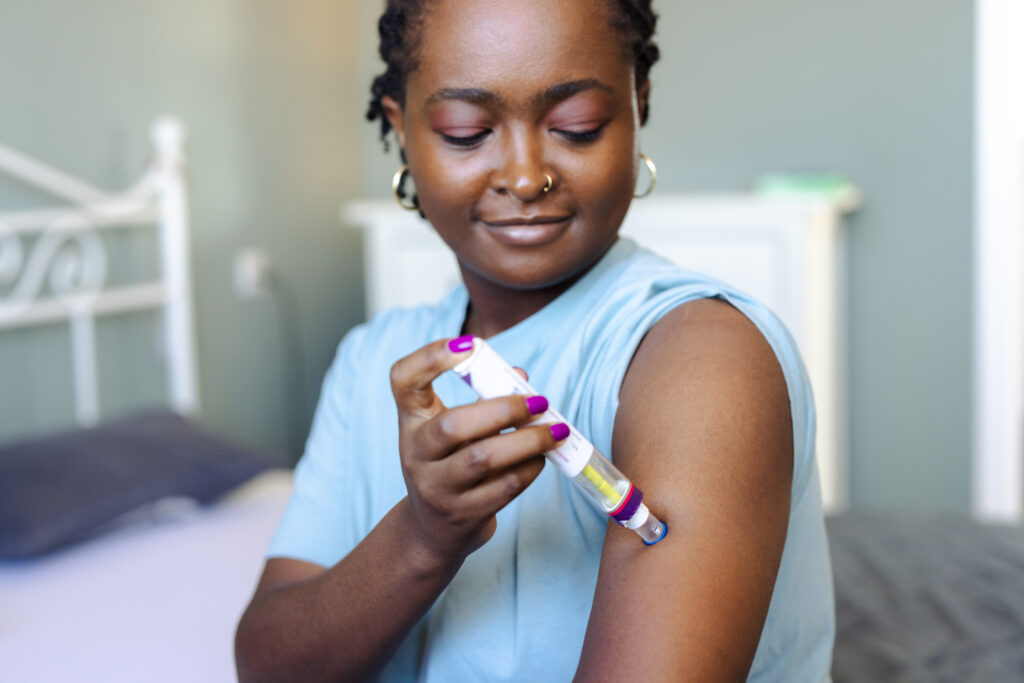
Insulin resistance—when your body stops responding to insulin effectively—affects nearly 40% of Americans ages 18 to 44, putting them at risk for a host of health problems including diabetes, heart disease and even mental health conditions such as depression and anxiety.
Untold millions more show evidence of insulin resistance, a precursor to those conditions.
How can the process be interrupted to enhance the chances for a long, healthy life? It begins with stopping insulin resistance in its tracks.
What Is Insulin Resistance?
Insulin is a hormone made by the pancreas that shuttles glucose, a type of sugar, from the blood into the cells where it can be used for energy or stored for later use.
“If you think of a cell like a house, insulin knocks at the door to let sugar into the cell,” said Ruchi Mathur, MD, an endocrinologist at Cedars-Sinai.
Insulin resistance happens when your cells don’t respond to the knock at the door and the pancreas continues churning out insulin to move the process along. Over time, the pancreas struggles to keep up and glucose builds up in the blood, and that can lead to prediabetes and Type 2 diabetes.
Who Is at Risk of Developing Insulin Resistance?
Anyone can develop insulin resistance, but certain factors increase your risk, such as:
- Age: Pancreatic function deteriorates with age, increasing the likelihood of developing insulin resistance.
- Medical history: People who have a family history of Type 2 diabetes or a personal history of gestational diabetes.
- Ethnicity: People who are Black, Latin, American Indian, Alaska Native and Asian have a higher risk of insulin resistance.
Certain medications, including glucocorticoids, and certain antipsychotics and HIV medications increase the odds of developing insulin resistance. Health conditions, too, such as hypertension, high cholesterol, polycystic ovarian syndrome and nonalcoholic fatty liver disease are associated with insulin resistance.
How Can You Prevent Insulin Resistance?
Even if the genetic chips and other factors are stacked against you, there are plenty of steps you can take.
- Lose weight. If you’re overweight, even modest weight loss can boost insulin response. “Some people recommend a specific diet or time-restricted eating, but as long as you reduce the total number of calories you eat, weight loss and improved insulin sensitivity should follow,” said Nicolas Musi, MD, an endocrinologist at Cedars-Sinai.
Quick tip: Close the kitchen a few hours before bed. A study published in The American Journal of Clinical Nutrition reported that late eating is linked with greater insulin resistance. - Move more. “Exercise of all types helps your body become more sensitive to insulin,” Mathur said. You don’t have to become an Olympic athlete to benefit. Just find ways to move more throughout the day.
Quick tip: Take a short stroll after meals. Research shows that a 20-minute walk after dinner helps improve insulin sensitivity. - Eat whole foods. Highly processed foods often lead to blood sugar spikes. To keep blood sugar levels stable, eat balanced meals, including plenty of vegetables, fiber-rich fruits and lean proteins.
Quick tip: Eat foods rich in prebiotics and probiotics, such as asparagus, onions, garlic, apples, kefir, yogurt and sauerkraut to support gut health and promote blood sugar control. - Make sleep a priority. Sleep plays a critical role in blood sugar control. Even losing sleep over a single night increases insulin resistance, which in turn spikes blood sugar levels.
Quick tip: Aim to get seven to nine hours of high-quality sleep each night. - Visit your doctor. Work with your primary care provider to manage risk factors such as high blood pressure, elevated cholesterol levels and sleep problems—such as sleep apnea and insomnia.
Quick tip: If you have any risk factors for insulin resistance, ask your doctor for an evaluation. “Most physicians don’t manage insulin resistance, so you may need to advocate for yourself,” Mathur said.
How Do You Know If You’re Insulin Resistant?
Many people with insulin resistance don’t notice symptoms until years later. However, common signs include:
- Weight gain
- Excessive thirst or hunger
- Fatigue
- Irregular periods
Unlike prediabetes and diabetes, which have clear-cut criteria (a fasting blood glucose level between 100 to 125 mg/dL, and a fasting blood glucose level of 126 mg/dL or higher, respectively), insulin resistance is more difficult to detect.
“With insulin resistance, your blood glucose levels might be normal, but your insulin levels spike so glucose can be metabolized properly,” said Mathur.
In the absence of obvious symptoms, doctors use a suite of tests to assess how your body responds to insulin, including fasting glucose levels, hemoglobin A1C and something called a glucose tolerance test where they monitor your body’s response to a sugary drink. “If insulin levels spike super high, it indicates a level of resistance,” Mathur said.
Once insulin resistance sets in, it’s hard to reverse and can lead to long-term complications, including prediabetes and diabetes.
“Being an active participant in your own health and taking proactive steps to control blood sugar levels can help prevent insulin resistance and improve your long-term health and wellbeing,” said Musi.








